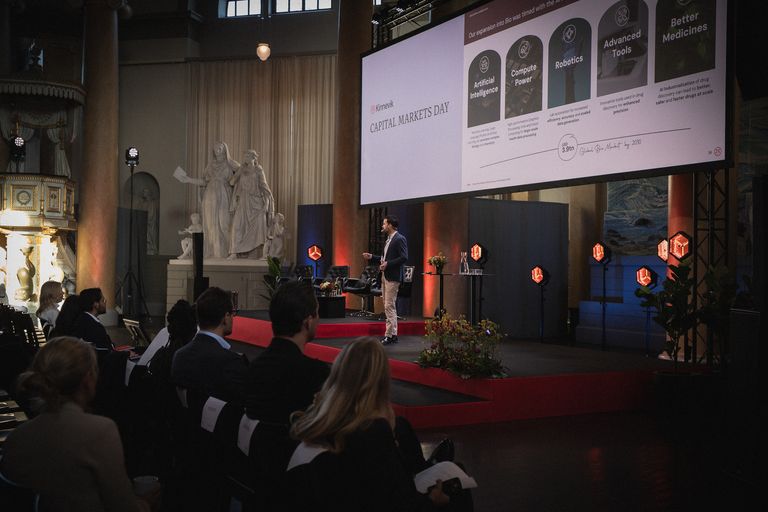
Why Pleo has succeeded where others have not
The last two years have been incredibly challenging for most companies in the venture and growth arena. These challenges have highlighted the distinction between companies capable of creating lasting value and those less likely to succeed, crystalising the gap between good – and less good. Nevertheless, it’s not a simple analysis to understand why some companies succeed when others fail, but rather a nuanced and multifaceted process.
By Andreas Bernström, Senior Investment Director at Kinnevik and Chairman of Pleo.
Right Mission, Right Time
Many industries have been disrupted, including the world of expense management. When Pleo founders Jeppe Rindom and Nicco Perra entered this domain, they saw an opportunity to revolutionise a traditionally poor product experience – but more importantly, they took the whole category and turned it on its head.
Prior to Pleo, expense management software had traditionally been sold to CFOs and finance offices, but the product itself was predominantly used by employees. Pleo therefore tailored their service to delight employees, believing that the better the service was for them would ultimately improve the life of finance teams as well. The magic of a product that spenders love brings adherence, compliance and freedom back to finance teams. It meant transforming the role that finance played in the organisation and creating unity across the company. The added benefit is that it builds service advocates in all companies, a legion of ambassadors who sell the service internally to their senior teams.
As Pleo has grown, they have needed to adapt to certain financial requirements around control, but their ultimate mission is the same: to delight the end-user, offer them freedom, trust and control.

Product, Product, Product
From our first meeting with Nicco and Jeppe it was clear that everything came down to product. Not only asking the vital question of how to ensure that the service Pleo is providing offers the best user experience to employees – but how can integrations work for partners? How can we simplify the user experience? And how can we ensure that our internal tools are intuitive, easy to use and allow Pleo staff to offer the best service internally? A mindset of relentless development now reflected by their 'best in class' ratings on software review plaforms like G2 and Capterra.
Exceptional spend management means capturing all spend types. Pleo recognised the need to unlock business-led spend categories so that the company could shift from being expense management to spend management. In practice, this meant becoming agnostic to how you pay: scaling reimbursements, introducing invoice product and resolving cashflow worries – whether through automatic top-ups, credit, or dedicated ways to pay like vendor cards.
Again, by going deep into spend management, it has been essential to ensure that Pleo offers the best tailored service to all key markets. In the world of expense management, cashback exploded in 2020 in the US, mainly as a sales incentive. Pleo recognised both the danger and the opportunity of this, but rather than being struck by ‘FOMO’ (Fear Of Missing Out) and launching a similar product, the company spent time and effort to understand how cashback and debit could be used to help companies at the right time.
This laser-sharp focus combined with excellence in product has allowed them to lead the field on innovation around expense management. This can be seen with their recent feature announcements, including vendor cards, Pleo overdraft, and budgeting.
Sales & Marketing to Product Led growth
It would be remiss to not mention Pleo’s excellence in go-to-market strategies. The company shifted from a sales-heavy approach to a more product-led motion, a transition spurred by the realisation that customers prefer self-service options and the industry's trend towards valuing efficiency over rapid growth.
This model integrates product-led growth throughout the customer journey, emphasising customer choice, hyper-personalisation, and a seamless experience across all stages.
Pleo restructured its go-to-market organization from a traditional assembly line to a domain model, decentralizing decision-making and aligning product teams with specific customer challenges. This approach embedded product-led growth across the go-to-market motion, enhancing efficiency and customer engagement.
The end result is a hyper scalable and efficient go-to-market strategy, distinguished by best-in-class payback, stronger unit economics, and higher retention rates thanks to a better customer experience and product stickiness.
Adaptability
Different stages of a company require different approaches and different talent. You need to adapt, think carefully, and move fast.
Pleo were one of our first portfolio companies to recognise the macro environment had changed, and with it the dry up of funding, that growth at all costs was no longer as highly valued. They made the difficult decision in 2022 to change direction towards higher efficiency in all aspects of the business, which meant they managed to keep a strong growth profile without adding any headcount.
Jeppe’s approach to board support has also evolved in recent years, such as acknowledging the need for a different set of competencies to be able to develop and grow into a large company in a financially regulated environment – competencies that were not available from the investor representatives. As such Vanessa Bailey joined the board in August 2021 as Chair of Risk Committee with experience from similar roles at Natwest, Wells fargo and Barclays. Likewise, Adrienne Gormley joined with her experience as head of EMEA for Dropbox and COO of N26. It’s no coincidence that these joiners were women, with Jeppe understanding and championing for the board’s need to reflect the values held by Pleo, as well as its customer base.
Team & Leadership
Jeppe and Nico have set the tone for Pleo’s leadership from the start, such as being a hybrid workplace. Essentially, this means a remote-first approach with offices to allow collaboration and regular get-togethers called “TeamCamps” to build clarity of direction and strong bonds between coworkers. At one such TeamCamp in 2022, 175 new employees had joined and Jeppe started by welcoming each and every one by name without notes. It may seem trivial, but that attention to detail is rather the opposite. Everyone is important, or no one matters.
Pleo’s hiring philosophy can be summarised with a steady focus on hiring for talent, for chemistry – but also for thinking outside the box. Pleo has attracted a number of highly talented senior executives over the last years, from Arun Mani, engineer-gone-product manager-gone-seasoned Chief Revenue Officer who has done an incredible job on the GTM machine. Also Mette Gade, who joined as Chief People Officer (CPO) from a partner role at Mckinsey, but transitioned in to the CPO role. Something most people, including the board, raised an eyebrow to but Jeppe saw characteristics with Mette that transcend function – and instead recognised an individual who is world class at structure, process and most importantly communication. The relationship forged between her, Arun and Meri Williams, Pleo’s free thinking CTO, has been key to creating the “loop” explained here by Haresh. Pleo’s version of product led growth, which embraced a cross-functional organisation combining traditional go-to-market teams with product, content, and product marketing teams.
But these things are not left to chance. The teams have specific sit downs around communication, encompassing how to interact, how to understand each other’s personalities and how to best work together.
Again, the details matter. The management team is called the “Lighthouse”, aiming to be a beacon of light and a guiding direction to all Pleo staff.
Culture
Culture is often difficult to explain and can’t be put down in a PPT slide or PDF document, but nevertheless, it permeates everything within the organisation.
We see it as the values by which you treat every part of your company and its customers. It’s also not something that happens by chance, it’s a very distinct direction, with the top setting the tone. Pleo is ambitious, driven and delivers excellence. But like its product mission, it puts its employees at the heart of what it does.
Pleo empowers its teams and individuals to be creative and to solve complex challenges. It understands that flexibility and adaptability are necessary to hire, retain and develop the best talent. It offers them the opportunity to grow and be themselves. A great example of this was Pleo’s take on ESG. In many companies a box ticking exercise, but not for Pleo, it needed to come from inside the company and reflect the opinions and beliefs of its employees. Thus was Pleo’s “authentic impact strategy” born, which precipitated their “Belonging Zine” - an open source, data-driven initiative to cultivate “belonging” in the workplace.
Sticking to Your Guns
Expense management is a large, broad and fragmented industry. As companies grow and are well capitalised it’s easy to get overly zealous, to cut corners or try to buy yourself to success. After Pleo’s Series D funding, they had $350m on the balance sheet with an owner base with growth expectations. The opportunity to expand the product portfolio or to buy scale and geographies was real. But Pleo did their homework, diligencing the market in considerable detail for months. This analysis allowed them to understand that the most value in an overvalued market would not come from acquisitions, but could be created by going deep into expense management and being the best at their core competencies. The tradeoff being, rather than growing exponentially on a delicate foundation, Pleo would build a robust base in an efficient manner to ensure a strong platform for future opportunities. In hindsight, Pleo made the right call.
With this more focused and capital efficient approach, Pleo was still able to grow approximately 70% in 2023, maintaining a best-in-class net revenue retention. Indeed, relative to its European counterparts, Pleo has generated a far greater return on invested capital (see table below) while achieving clear dominance in the category.

Conclusion
Past successes are no guarantee for further achievements, and the tech landscape is littered with companies that scaled fast only to drop the ball. Pleo has however impressively navigated a competitive market and has emerged stronger than when it entered. If they can stay true to their mission, continue building thoughtful and great products for their users and customers, as well as putting their own team at the centre of what they do and believe, then Pleo has every chance of continued success and the ability to build a sustainable category leader.


